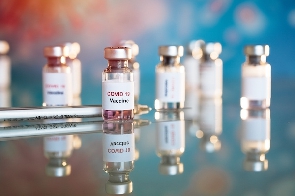- Home - Sports
- Soccer Portal
- Archived Sports News
- Sports Videos | TV
- Year In Review
- Sports Photos
- Sports Headlines
- Boxing
- Athletics
- Basketball
- Bodybuilding
- Cricket
- Golf
- Handball
- Hockey
- Martial Arts
- Tennis
- Volleyball
- Other Sports

Business News of Friday, 28 May 2021
Source: business24.com.gh
US$50 billion vaccine push could end the pandemic – IMF
An immediate global effort to step up the rollout of COVID-19 vaccine doses could represent “the highest-return public investment ever”, according to the International Monetary Fund.
In a paper entitled A Proposal to End the Covid-19 Pandemic, fund economists set out a US$50 billion plan they estimate could yield a $9trn benefit to the global economy by 2025.
The proposal includes vaccinating 40% of people by the end of 2021 and 60% by the first half of 2022, ensuring widespread testing and tracing, boosting stocks of treatments and enforcing public health measures.
“We estimate the cost of this proposal to be around US$50 billion, which is small compared to the potential benefits of a faster end to the pandemic, estimated at around US$9 trillion,” the authors said.
“Moreover, advanced economies stand to gain around $1trn in additional tax revenues, which means that funding this proposal may possibly be the highest-return public investment ever.”
Higher vaccine coverage would allow for lockdown measures to be eased, and a swifter rollout of jabs is cited by many economists as one of the most important factors in the recovery.
“By now we all know there is no durable end to the economic crisis without an end to the health crisis,” said IMF managing director Kristalina Georgieva at a European summit on Friday.
“That means pandemic policy is economic policy.”
She urged governments of advanced economies, particularly the G20, to step up their support for international programmes such as the vaccine scheme Covax.
An additional $4bn for Covax would allow it to increase its vaccination coverage goal from 20% to 30% across 91 low and middle-income countries, according to the IMF paper.
Donating surplus vaccines could also free up at least one billion doses in 2021, even if countries prioritise their own citizens, it said.
The fund envisages a total of $35bn of grant financing and about $15bn of concessional loans, but Georgieva said this needs to be sorted quickly.
“The proposal requires not just commitments but upfront financing, upfront vaccine donations, and upfront ‘at-risk’ precautionary investments,” she said.
“It is essential that all necessary financing is available as soon as possible.











